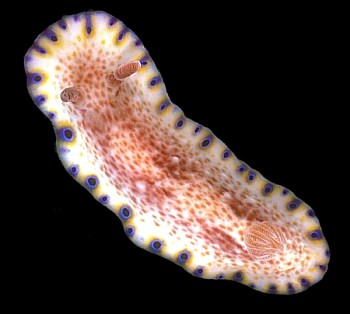
Chromodoris aureopurpurea
Collingwood, 1881
Order: NUDIBRANCHIA
Suborder: DORIDINA
Superfamily: EUDORIDOIDEA
Family: Chromodorididae
DISTRIBUTION
Tropical West Pacific.
PHOTO
UPPER RIGHT: nr Îlot Maître, Nouméa, New Caledonia, October 1988. 30mm long alive. PHOTO: Bill Rudman.
LOWER RIGHT: La Perouse, Botany Bay, Sydney, New South Wales, 10m, January 1977, 22mm long preserved. PHOTO: J.Fields.
LOWER LEFT: Koumac, New Caledonia, October 1993, 25mm long alive. PHOTO: Bill Rudman.
Note added 7 March 2005: see message #13260 suggesting this species may be synonymous with C. alius, C. albopustulosa , and C. rufomaculata , which would give it a wide Indo-West Pacific distribution.
Chromodoris aureopurpurea grows to about 40mm long. The mantle is white and there are yellow to dull brown irregular spots all over the central region. Right at the edge of the mantle is a band of diffuse watery purple and on its inside edge is a submarginal band of large deep purple spots. In all specimens seen from Australia, there is a yellow spot or crescent on the inside edge of each purple spot. There is usually an unspotted zone, quite wide anteriorly, separating the submarginal purple spots from the central region of the mantle spotted with yellow or brown.
The rhinophore clubs are heavily pigmented with purple or reddish brown and edged in white. The gills are translucent purple or red-brown, and also edged with white. The underside of the mantle, the sides of the body, and the foot are white except for the edge of the mantle which can be deep purple. There is some colour variation, with the dorsal spots ranging in colour from yellow to dull brown, and in size, from quite large blotches to small spots.
Chromodoris aureopurpurea was originally described from the coast of China as having a mantle covered with "small irregular blotches of bright yellow of a roundish or elliptical form. Mantle edged with faint violet and an irregular row of deep violet-shaded spots running all round upon the faint edging". Also the rhinophores and gills are of a dark colouration and edged in white. Specimens from Japan and China lack the yellow crescent or mark on the inside edge of each purple spot, which is found in specimens from Australia and New Caledonia. The faint violet marginal band and submarginal band of purple spots distinguish this species from Chromodoris rufomaculata and Chromodoris alius, in which the purple spots are right at the edge. Another similar species from the western Pacific is Chromodoris collingwoodi, and from the Indian Ocean, C. tennentana.
Reference:
•Rudman, W.B. (1987) The Chromodorididae (Opisthobranchia: Mollusca) of the Indo-West Pacific: Chromodoris epicuria, C. aureopurpurea, C. annulata, C. coi and Risbecia tryoni colour groups. Zoological Journal of the Linnean Society, 90: 305-407.
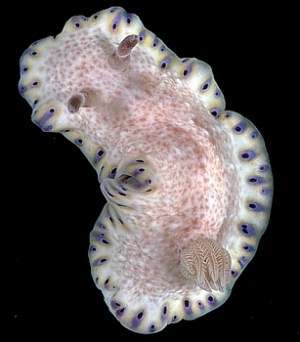
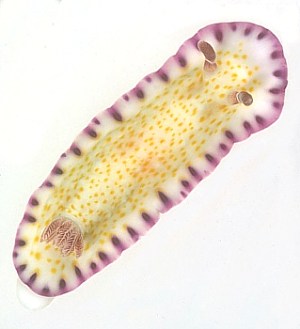
Rudman, W.B., 1999 (November 8) Chromodoris aureopurpurea Collingwood, 1881. [In] Sea Slug Forum. Australian Museum, Sydney. Available from http://www.seaslugforum.net/find/chroaure
Related messages
Feeding record for Chromodoris aureopurpurea from Port Stephens
March 24, 2010
From: Leanne and David Atkinson
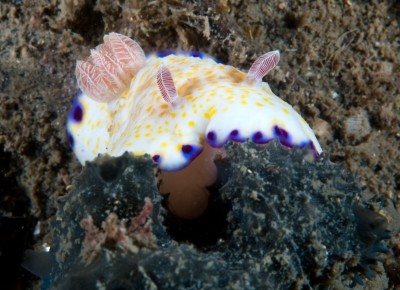
Concerning message #19178:
Hi Bill,
We found this Chromodoris aureopurpurea on a sponge with its mouth clearly visible. This is quite a common nudibranch in the Port Stephens area but it often has its head pushed into an overgrown area so it is difficult to see what it is feeding on. We were excited to find this one with the mouth parts so clearly visible. There doesn't seem to be any other messages re its food to compare with.
Locality: The Pipeline, Nelson Bay, Port Stephens, 5metres, New South Wales, Australia, Pacific Ocean, 06 February 2010, Sandy silty bottom with sea pens, sponges, ascidians, gorgonias, soft corals, hydroids and seaweed.. Length: 60mm. Photographer: Leanne and David Atkinson.
Hope it is of interest.
Regards
Leanne & David Atkinson
atk@hunterlink.net.au



Dear Leanne and David,
This is definitely of great interest. It is the first feeding record I have of this species and fits my observations that similarly coloured species are often found feeding on the same sponge species. This may be because they are closely related and their common ancestor developed a liking for a particular sponge or it could be that unrelated species can evolve a similar colour pattern so that they 'share the load' in teaching predators to avoid animals with their colour pattern because they are distasteful.
The sponge is the same species of Euryspongia that the similarly coloured C. collingwoodi usually feeds on [see your last message #23381].
Best wishes,
Bill Rudman
Chromodoris aureopurpurea from sthn Queensland
January 17, 2007
From: Bruce Wilkie
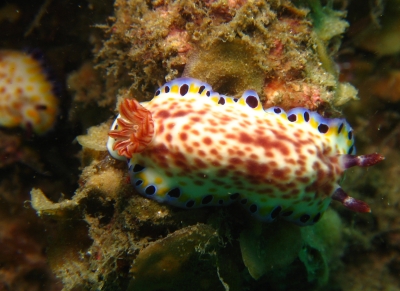

Hi Bill,
Looking through the Forum it seems you only have Chromodoris aureopurpurea from New South Wales and nthn Australia. I have included 3 animals for your records that were found in same area on the same day.
Locality: Amity Point, North Stradbroke Island, 8 metres, Queensland Australia, Moreton Bay, 08 January 2007, boat ramp - sandy channel, car bodies & junk. Length: 35 mm. Photographer: Bruce Wilkie.
Many thanks,
Bruce Wilkie.
brucedwilkie@yahoo.com.au
Wilkie,B, 2007 (Jan 17) Chromodoris aureopurpurea from sthn Queensland. [Message in] Sea Slug Forum. Australian Museum, Sydney. Available from http://www.seaslugforum.net/find/19178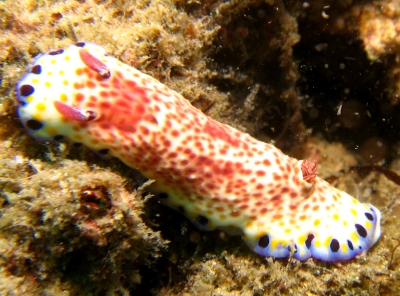
Dear Bruce,
It's nice to get a record from your part of the world
Best wishes,
Bill Rudman
Chromodoris aureopurpurea from INdonesia
January 20, 2006
From: Erwin Kodiat
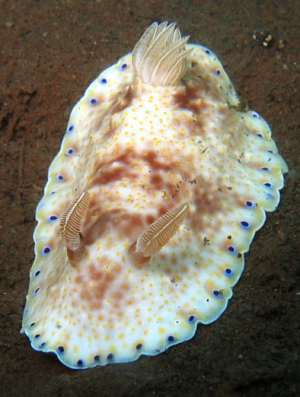
Hi Bill,
I took this shot at Tulamben, Bali. However can't ID it precisely. Debelius' book refer it to as Chromodoris rufomarginata while other reference calls it Chromodoris aureopurpurea. Which one is correct? .
Locality: Matahari Reef, Tulamben. Bali, Indonesia. Lombok Strait. Depth: 16 metres. Length: 5 cm. 1 January 2006. Sandy Photographer: Erwin Kodiat
Thanks in advance
Erwin Kodiat
ungu@terong.com
Kodiat, E., 2006 (Jan 20) Chromodoris aureopurpurea from INdonesia. [Message in] Sea Slug Forum. Australian Museum, Sydney. Available from http://www.seaslugforum.net/find/15561Dear Erwin,
I think you mean Chromodoris rufomaculata. Your photo is of 'typical' C. aureopurpurea. One of the characteristic features of its colour pattern are the yellow caps that sit on top of each of the purple spots around the mantle edge. However, just to complicate things have a look at the C. rufomaculata Fact Sheet where I suggest that further studies might show that a number of these similarly coloured species may be colour variants of one species.
Best wishes,
Bill Rudman
Chromodoris aureopurpurea from South Korea
September 6, 2005
From: Dong Bum Koh
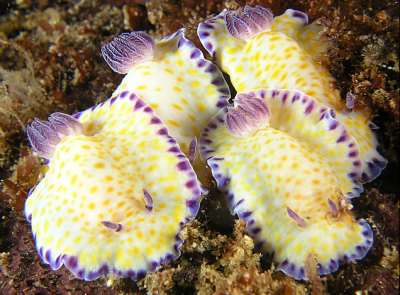

Dear Bill,
Here are photos of Chromodoris aureopurpurea from Sth Korea.
Locality: Ul Jin. Kyung Book Province, South Korea. Depth: 2 m. Length: Approx.25 mm. 31 Aug. 2005. rocky. Photographer: Ok Soo Kim
It looks like mating behavior but I'm not sure.
The dorsum of one animal has a balloon like swelling mass that is even bigger during observation than in the photos..Could you let me know, what is this?
Best regards,
Dong Bum Koh
drkoh@seasee.co.kr
Koh, D.B., 2005 (Sep 6) Chromodoris aureopurpurea from South Korea. [Message in] Sea Slug Forum. Australian Museum, Sydney. Available from http://www.seaslugforum.net/find/14696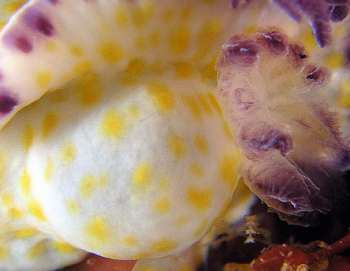
Dear Koh,
Your animals seem to be on the march somewhere. They don't seem to be mating or even positioned for mating. It is interesting how Jaoanese and Sth Korean specimens of this species have this typical yellow spotted pattern. However the dark spot in the lighetr purple patches around the mantle edge link the pattern to the slightly digfferentr pattern found elsewhere in the Indo-West Pacific.
I am pretty sure the swelling is a crustacean parasite in the pericardial cavity. I have seen similar infestations in species of Discodoris. In those the swelling was not obvious because the skin was thicker and stronger.
Best wishes,
Bill Rudman
Chromodoris aureopurpurea - egg-laying
March 13, 2003
From: Leanne & David Atkinson
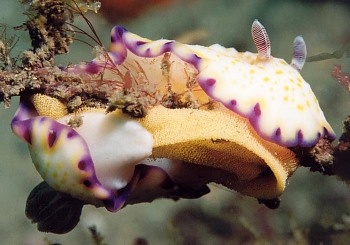
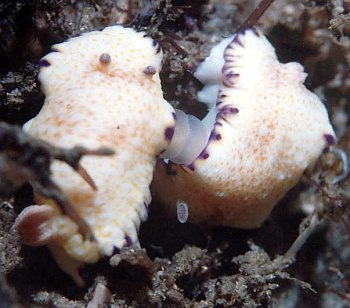
Dear Bill,
We've been looking at the Chromodoris aureopurpurea on the Forum and you don't seem to have any photos of mating or egg laying so we would like to contribute these. Both were taken in the Marine Reserve at Port Stephens, New South Wales, eastern Australia.
The pair mating were at Fly Point, in 10 meters, on the high tide, during the day in January 2003. The one with eggs was at Little Beach on the 5:15pm high tide 29.12.2002, water temperature 19 degrees c. This summer season has been very good for nudibranch spotting.
Cheers,
Leanne & David Atkinson.
atk@hunterlink.net.au
Atkinson, L & D., 2003 (Mar 13) Chromodoris aureopurpurea - egg-laying. [Message in] Sea Slug Forum. Australian Museum, Sydney. Available from http://www.seaslugforum.net/find/9272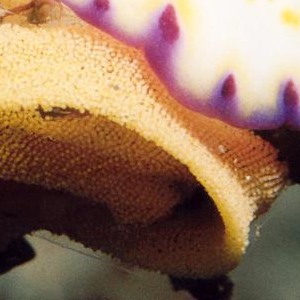
Dear Leanne & David,
Thanks for these great photos - and thanks for looking for information gaps on the Forum that need filling.
Best wishes,
Bill Rudman
Chromodoris aureopurpurea from Lembeh Strait
December 14, 2002
From: Mary Jane Adams
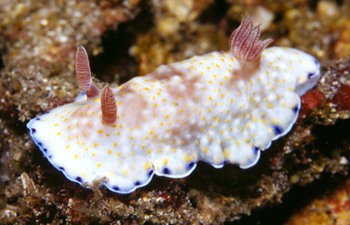
Hi Bill,
I believe this is Chromodoris aureopurpurea. I found it at Nudi Falls divesite, Lembeh Strait, Sulawesi Island, Indonesia on Nov. 18, 2002. It was 20mm long and about 8 meters deep.
Best regards,
Mary Jane
divepng@yahoo.com
Adams, MJ., 2002 (Dec 14) Chromodoris aureopurpurea from Lembeh Strait. [Message in] Sea Slug Forum. Australian Museum, Sydney. Available from http://www.seaslugforum.net/find/8617Thanks Mary Jane,
Bill Rudman
Chromodoris aureopurpurea from New South Wales
November 25, 2002
From: Allan Saben

I wonder if you could please identify this species. It was taken at Nelson Bay, Port Stevens, new South Wales [easterrn Australia]. Old sewerage Pipe
Depth: 15 meters
Macro 1:2
Allan Saben
asaben@bigpond.net.au
Saben, A., 2002 (Nov 25) Chromodoris aureopurpurea from New South Wales. [Message in] Sea Slug Forum. Australian Museum, Sydney. Available from http://www.seaslugforum.net/find/8401Dear Allan,
This is Chromodoris aureopurpurea.
Best wishes,
Bill Rudman
Nudibranch from Oak Park, Sydney
November 14, 2002
From: Janet Hall
Would you be able to help identify a nudibranch I saw while diving at the 2nd reef off Oak Park, Cronulla, [Sydney, Australia] last Sunday, 3rd November 2002. In only 5 metres on the edge of the reef. It was white with yellow dots, with an unbroken dark blue edge,with black rhinophores and cream coloured gills.
Thank you.
Janet Hall
janet27@optusnet.com.au
Hall, J., 2002 (Nov 14) Nudibranch from Oak Park, Sydney. [Message in] Sea Slug Forum. Australian Museum, Sydney. Available from http://www.seaslugforum.net/find/8377Dear Janet,
It's very difficult to identify and animal with so little information and no photo. My best guess would be Chromodoris aureopurpurea, but I could be quite wrong. Have a look at Akos Lumnitzer's photo from Port Stephens.
Best wishes,
Bill Rudman
Chromodoris ? from Indonesia
June 17, 2002
From: Alice Lee
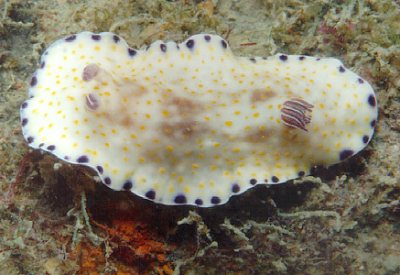
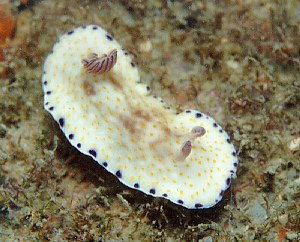
Hi Bill,
Couldn't figure out what species of Chromodoris is these. It is from Riau Archipelago, [Indonesia, just south of Singapore] Please help to identify.
Thanks.
Alice
alee@dlink.com.sg
Lee, A., 2002 (Jun 17) Chromodoris ? from Indonesia. [Message in] Sea Slug Forum. Australian Museum, Sydney. Available from http://www.seaslugforum.net/find/7159Dear Alice,
This is a form of Chromodoris aureopurpurea. I would be grateful if you could send a little more information about the photos you are contributing. One of the purposes of the Forum is to build up more information on these wonderful animals we are all interested in. If you could provide some basic information such as date, depth, size etc, it would make your message not just an inquiry for a name but a valuable piece of information available to us all.
best wishes,
Bill Rudman
Chromodoris aureopurpurea from New South Wales
April 22, 2002
From: Ákos Lumnitzer
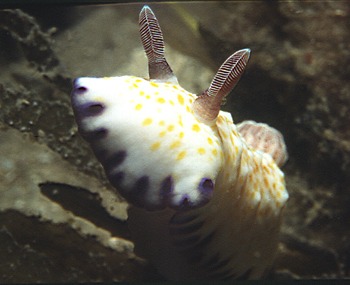
Hi Bill
We found quite a few specimens of Chromodoris aureopurpurea at Nelson Bay recently. I wonder about the species' distribution range as we haven't seen them in our neck of the woods before. (Sydney that is)
Thanks for your help.
Regards
Ákos Lumnitzer
Akos.Lumnitzer@exel.com
Lumnitzer, A., 2002 (Apr 22) Chromodoris aureopurpurea from New South Wales. [Message in] Sea Slug Forum. Australian Museum, Sydney. Available from http://www.seaslugforum.net/find/6786Dear Ákos,
C. aureopurpurea is found in the western Pacific from Japan to the east coast of Australia. It has been occasionally reported from the Sydney region but is more at home in the tropics. There is a photo in the C. aureopurpurea Fact Sheet of an animal from Botany Bay. In the Indian Ocean there is a closely related species C. alius.
Best wishes,
Bill Rudman
Chromodoris aureopurpurea from Japan
September 1, 2001
From: Jun Imamoto
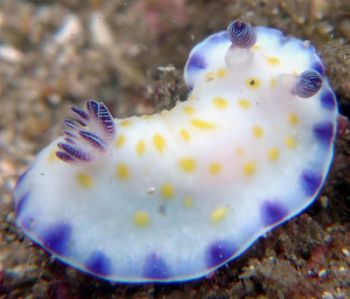
Dear Bill
Because there is not a report on the Forum from Japan, I send it. It resembles the photo of Chromodoris aureopurpurea of Hong Kong.
Those are common sea slugs there, but I am happy if those are helpful for you. Thet are from Echizen coast (Tsuruga Bay, Japan)
UPPER RIGHT: Depth: 5m, Size: 25mm
Water temperature: 26-28C degrees.
LOWER LEFT: Depth: 5-7m, Size: 30-40mm
Water temperature: 26-28C degrees.
LOWER RIGHT: Depth: 5-7m, Size: 30-35mm
Water temperature: 26-28C degrees.
Best Regards,
Jun Imamoto
imamoto@wips.co.jp
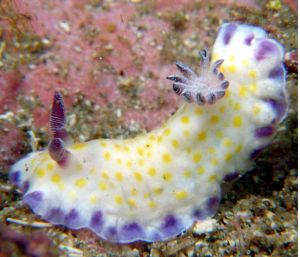
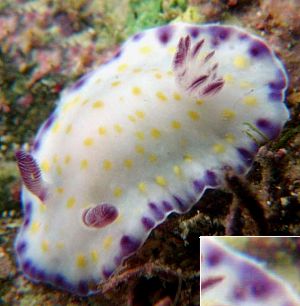
Dear Jun,
Thanks for these interesting photos. Even the most common Japanese species are of interest because so many species of the many species descrbed by Dr Kikutaro Baba from Japan, have a much wider distribution throughout the tropical Indo-West Pacific. So for anyone working on that Indo-West Pacific fauna it is vital to understand the Japanese fauna so we know whether a species we have found in Australia or South Africa has already been named from a Japanese specimen.
Best wishes,
Bill Rudman
Chromodoris aureopurpurea from Hong Kong
July 12, 2001
From: Leslie Chan

Dear Bill,
Could you identify this nudibranch which I photographed in Hong Kong.
Details: 12m, Ping Chau, Hong Kong. 16 October 2000.
Thanks
Leslie Chan
leslie@lesmart.com
Chan, L., 2001 (Jul 12) Chromodoris aureopurpurea from Hong Kong. [Message in] Sea Slug Forum. Australian Museum, Sydney. Available from http://www.seaslugforum.net/find/4761Dear Leslie,
This is Chromodoris aureopurpurea. This colour form is the one commonly decribed from Japan, so perhaps there are northern and southern colour forms of this species.
Best wishes,
Bill Rudman
Chromodoris aureopurpurea? from Papua New Guinea
August 15, 2000
From: M.J. Adams
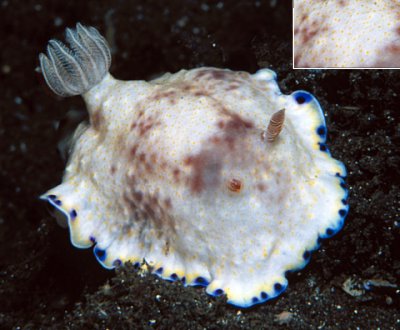
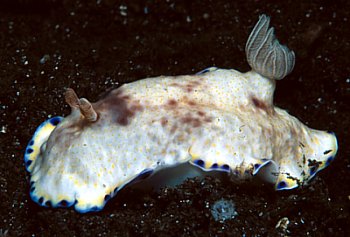
Hi Bill,
Is this Chromodoris aureopurpurea? I found it crawling over a silty sand slope at Luadi, Milne Bay Province, Papua New Guinea, March, 1999.
Depth = 10 meters
Crawling length = 32 mm
Thanks!
Mary Jane
mjadams@earthlink.net
Adams, M.J., 2000 (Aug 15) Chromodoris aureopurpurea? from Papua New Guinea. [Message in] Sea Slug Forum. Australian Museum, Sydney. Available from http://www.seaslugforum.net/find/2837Dear Mary Jane,
Another interesting photo. It has similarities to Chromodoris rufomaculata and Chromodoris alius in having such fine yellow spots, but both those species have no colour in the gills, and only Chromodoris aureopurpurea has the large purple spots inside the translucent bluish purple border. The yellow spots, especially those flanking the inside of the purple spots, are also typical of C. aureopurpurea, as are the larger brownish spots in the central part of the mantle.
The photos increase our knowledge of the colour variation in this species.
Best wishes,
Bill Rudman.
What is this one?
August 13, 2000
From: Des Paroz

Hi Bill
Been a while since I posted. Finally got a new slide scanner, and have gone and scanned a number of images dating back quite some time.
This one was in Nelson Bay, Port Stephens, New South Wales [Australia] at Halifax Park. Photo was taken in January, 2000. Haven't come across if before, although its probably quite common in places.
Would appreciate your assistance.
Best regards
Des
des@paroz.com
Paroz, D., 2000 (Aug 13) What is this one?. [Message in] Sea Slug Forum. Australian Museum, Sydney. Available from http://www.seaslugforum.net/find/2856Dear Des,
It's a bit hard to be 100% sure from the photo, but I am pretty convinced it is Chromodoris aureopurpurea. The position of the dark purple spots, with the purple border extending in to incorporate them, is typical of the species.
Best wishes,
Bill Rudman.
